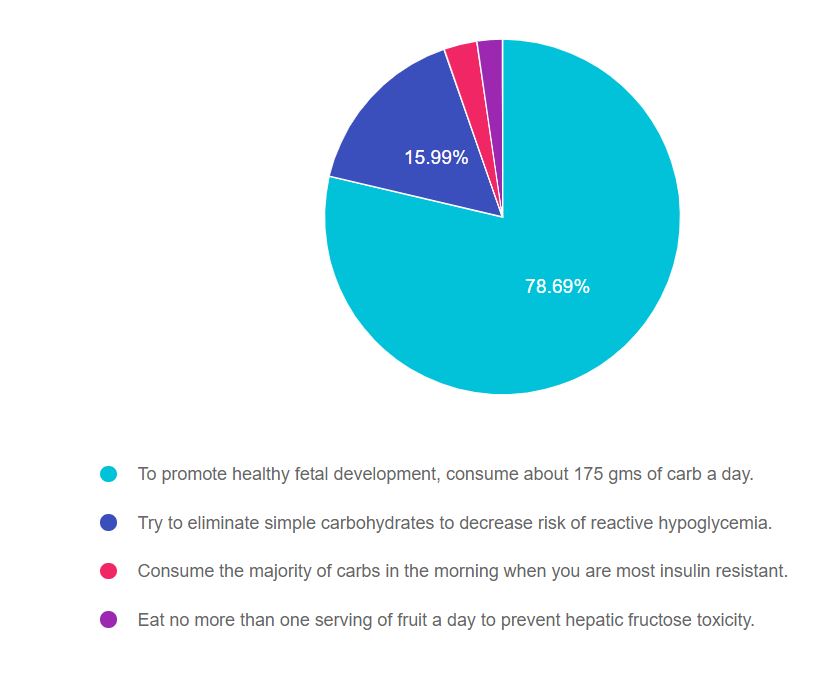
For our July 20th Question of the Week, 78% of respondents chose the best answer. GREAT JOB! We want to “take a closer look” at this question and determine strategies to choose the best response.
Before we start though, if you don’t want any spoilers and haven’t tried the question yet, you can answer below: Answer Question
Question 1: LS is 26 weeks pregnant and just discovered she has gestational diabetes. LS asks you what type of meal planning approach will help keep her and the baby healthy.
According to the ADA Standards of Care, what is the most accurate response?
Answer Choices:
- To promote healthy fetal development, consume about 175 gms of carb a day.
- Try to eliminate simple carbohydrates to decrease risk of reactive hypoglycemia.
- Consume the majority of carbs in the morning when you are most insulin resistant.
- Eat no more than one serving of fruit a day to prevent hepatic fructose toxicity.

As shown above, the most common choice was option 1, the second most common answer was option 2, then option 3, and finally option 4.
Getting to the Best Answer
If you are thinking about taking the certification exam, the content of this practice test question will set you up for success. Being familiar with diabetes self-management guidelines and considerations during pregnancy is critical for exam success. If you don’t work with people with diabetes during pregnancy, I encourage you to be familiar with the ADA Standard on Diabetes and Pregnancy and to consider joining our online course for a 1.5 hour painless summary of this standard (see below). Lastly, don’t forget to leverage your common sense and vast health care knowledge to get to the best answer for these specialty topics. Coach Beverly
Answers & Rationale
Answer 1 is correct, 78.69% chose this answer, “To promote healthy fetal development, consume about 175 gms of carb a day.” GREAT JOB. According to the ADA Standard on Diabetes and Pregnancy, the food plan during pregnancy is individualized based on a nutrition assessment with guidance from the Dietary Reference Intakes (DRI). The DRI during pregnancy recommends a minimum of 175 g of carbohydrate, a minimum of 71 g of protein, and 28 g of fiber, with an emphasis on monounsaturated and polyunsaturated fats while limiting saturated fats and avoiding trans fats. All people with diabetes during pregnancy need to meet with a RD/RDN for specific guidance and recommendations.
Answer 2 is incorrect, 15.99% of you chose this answer, “Try to eliminate simple carbohydrates to decrease the risk of reactive hypoglycemia.” This is a juicy answer. It is true that eating less simple carbs, including processed foods and beverages, is a good idea before, during and after pregnancy. However, the second part of the answer makes this response incorrect for two reasons; the term “reactive hypoglycemia” is not a generally accepted diabetes term in this context and eliminating simple carbs would potentially increase the risk of hypoglycemia.
Answer 3 is incorrect, 3.02% of you chose this answer, “Consume the majority of carbs in the morning when you are most insulin resistant.” Part of this answer is correct. During pregnancy, many people are more insulin resistant in the morning. But, if a person is more insulin resistant in the morning, they would decrease the consumption of morning carbs to prevent post breakfast spikes.
Answer 4 is incorrect, 2.31% of you chose this answer “Eat no more than one serving of fruit a day to prevent hepatic fructose toxicity.” During pregnancy, incorporating a variety of fruits in the meal plan is a great idea, since they are packed with micronutrients, vitamins and fiber. They are carbohydrates and will increase blood sugars, so portion size and timing are important to consider when working them into the meal plan.
We hope you appreciate this week’s rationale! Thank you so much for taking the time to answer our Question of the Week and participate in this fun learning activity!
Want to learn more about this topic? Enroll in our
Level 2 | Pregnancy & Diabetes Standards | 1.5 CE

People living with diabetes who are pregnant are confronted with a variety of issues that require special attention, education, and understanding.
This course reviews those special needs while focusing on Gestational Diabetes and Pre-Existing Diabetes. Included are the most recent diagnostic criteria, management goals, and prevention of complications during pregnancy. A helpful review for the CDCES Exam and for those who want more information on people who are pregnant and live with Diabetes.
Topics include:
- Three issues that affect pregnancy with diabetes
- The unique attributes of pre-existing diabetes in pregnancy and gestational diabetes
- Diagnostic criteria and management goals for gestational diabetes
- Potential short term and long term complications of fetal exposure to hypoglycemia
- Prevention measures to keep mother and baby healthy
See Full Calendar for upcoming webinars.
Sign up for Diabetes Blog Bytes – we post one daily Blog Byte from Monday to Friday. And of course, Tuesday is our Question of the Week. It’s Informative and FREE! Sign up below!
[yikes-mailchimp form=”1″]Accreditation: Diabetes Education Services is an approved provider by the California Board of Registered Nursing, Provider 12640, and Commission on Dietetic Registration (CDR), Provider DI002. Since these programs are approved by the CDR it satisfies the CE requirements for the CDCES regardless of your profession.*
The use of DES products does not guarantee the successful passage of the CDCES exam. CBDCE does not endorse any preparatory or review materials for the CDCES exam, except for those published by CBDCE.









